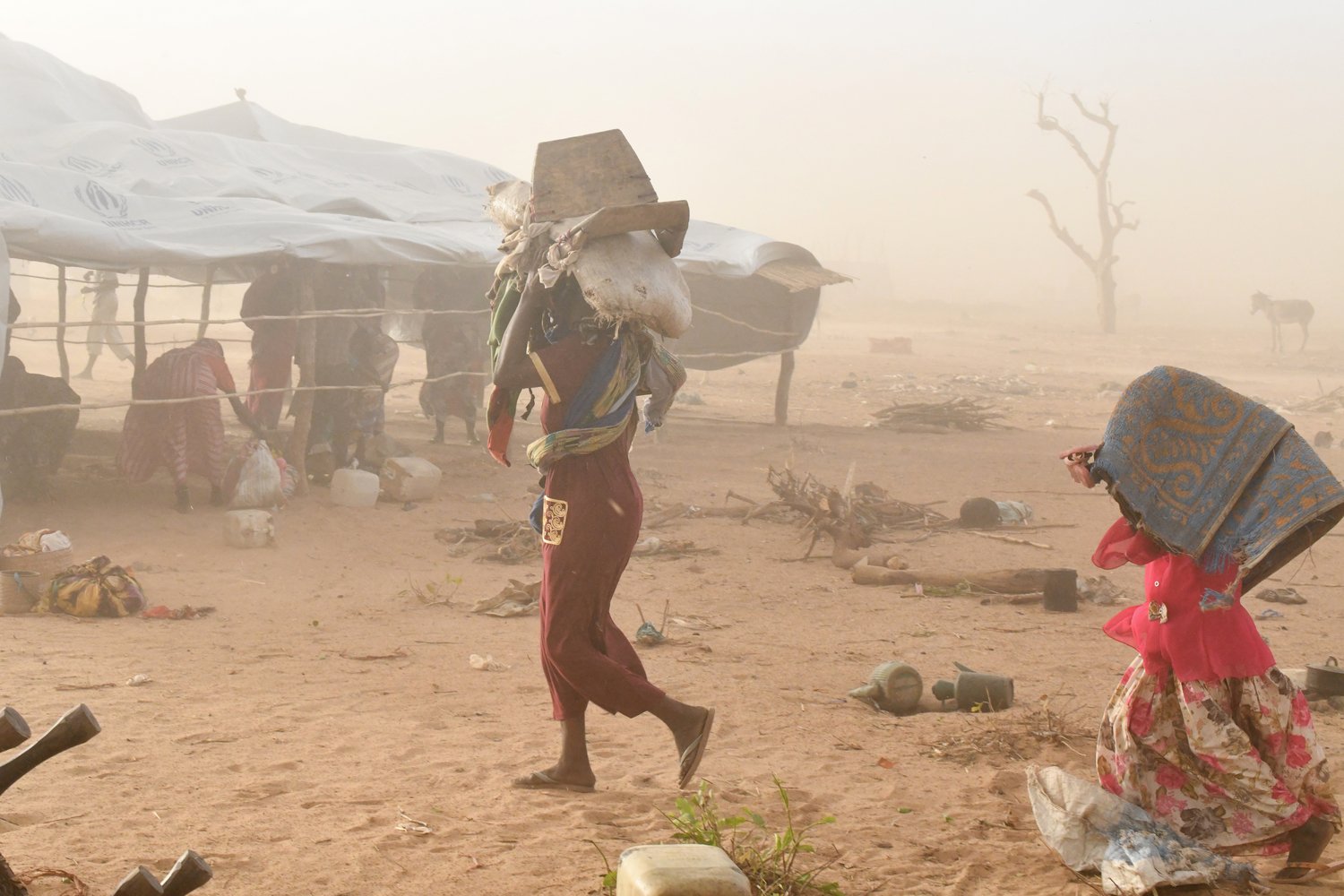UNHCR highlights difficulties in aid delivery amid escalating conflict in Sudan
UNHCR highlights difficulties in aid delivery amid escalating conflict in Sudan

Sudanese refugees seek shelter from a sandstorm in the border town of Amdafock in the Central African Republic.
GENEVA – UNHCR, the UN Refugee Agency, is increasingly alarmed over growing humanitarian needs among those affected by the crisis in Sudan, as displacement numbers continue to surge while delivery of assistance remains heavily constricted by insecurity, lack of access and funding shortfalls.
Over two and a half million people have been displaced by the conflict since 15 April, with more than 560,000 people seeking safety in neighbouring countries – with Egypt receiving the highest number, followed by Chad, South Sudan, Ethiopia and the Central African Republic -– and nearly two million people displaced inside the country.
In Sudan, ongoing fighting in the capital, Khartoum, and in the Darfur and Kordofan regions, has left many stranded and cut off from basic humanitarian assistance. UNHCR has received worrying reports of displaced civilians including refugees experiencing life-threatening obstacles while attempting to seek safety within the country and across borders. Due to the intensity of the conflict, vulnerable people on the move have been left with little choice than to flee in extremely dangerous and difficult conditions, risking physical abuse, theft and banditry, and in some cases, denied movement out of conflict areas and forced back into harm’s way.
Our teams are intensifying efforts to support those arriving in safer locations through registration, delivering of emergency aid and expanding services in existing sites. However, lack of access to affected areas hinders the provision of essential resources and services to vulnerable civilians.
We are particularly concerned about the worsening situation in West Darfur, where according to reports from colleagues on the ground, the conflict has reached alarming levels, making it virtually impossible to deliver life-saving aid to the affected populations. Increasing numbers of injured civilians are among the newly arrived refugees in Chad.
Capacities at border reception and transit facilities in neighbouring countries have been strained due to the sheer numbers of people arriving, leading to overcrowding and further stretching of already limited resources. Those fleeing Sudan arrive exhausted after days or sometimes weeks on the road, shocked by the violence they have witnessed and in need of food, medical care and relief items.
In response to this escalating crisis, UNHCR and partners have scaled up efforts to address the needs of displaced populations inside and outside of Sudan. We are working closely with the government, other UN agencies, humanitarian partners and host communities to ensure the provision of emergency shelter, clean water, health care services, psychosocial support and other vital assistance.
The remote and, in some cases, volatile nature of these border regions raises concerns about the safety of refugees. As the rain has already arrived in some countries, the delivery of aid has started to be seriously affected. UNHCR teams are working around the clock to pre-position relief items and relocate people from border areas to more accessible sites.
In South Sudan, limited infrastructure and security concerns are further challenging onward movements of new arrivals. Much of the assistance required will need to be airlifted, which is both costly and complex. However, teams are registering new arrivals, providing them with emergency relief, and facilitating their movement to different locations as quickly as possible. The priority of the emergency response remains to support new arrivals in reaching their areas of origin or preferred destinations, while refugees are being moved to existing or newly developed camps – movement that is now becoming ever more challenging due to the onset of the rainy season.
In Chad, concerted efforts are being made to address the needs of newly arrived refugees, including women and children, who have fled from violence and intense fighting in West Darfur. Recognizing the profound impact of trauma they experienced during their flight, UNHCR and partners have created safe spaces where individuals can access counselling and mental health support. To ensure the safety and well-being of new arrivals, over 26,000 out of 120,000 individuals have been relocated from the border area to refugee camps while humanitarians continue to deliver critical emergency aid to those at the border.
Despite these efforts, resources are stretched thin. UN and partners have called for over $3 billion to help millions in Sudan and those fleeing to neighbouring countries. Governments who have generously opened their doors to people fleeing deserve more support from the international community. To date, both the Humanitarian Response Plan and the Refugee Response Plan are less than 20 per cent funded.
For more information, please contact:
- In Nairobi (regional), Faith Kasina, kasina@unhcr.org, +254 113 427 094
- In Dakar (regional), Alpha Seydi Ba, baalp@unhcr.org, +221 773 457 454
- In Geneva, Eujin Byun, byun@unhcr.org, +41 79 747 87 19
- In Geneva, Olga Sarrado, sarrado@unhcr.org, +41 797 402 307









